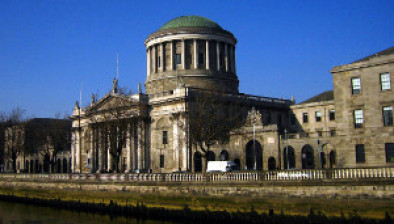High Court: Devlin Hotel not entitled to cover for pandemic losses under RSA policy of insurance

The High Court has determined that a hotel was not entitled to insurance cover for pandemic losses under an RSA policy of insurance. The policy required a notifiable disease to be “manifesting itself at the premises” for the policy to cover any losses.

About this case:
- Citation:[2022] IEHC 178
- Judgment:
- Court:High Court
- Judge:Mr Justice Denis McDonald
In a 94-page judgment, Mr Justice Denis McDonald held that there was no evidence of anyone at the hotel having Covid-19 at any point. The court held that the policy would only cover a symptomatic/diagnosed case at the hotel or the detection of the pathogen at the premises.
Background
The plaintiff was the Devlin Hotel which had a policy of insurance with RSA Insurance Ireland DAC. The policy covered business losses arising from closures of the premises. After the hotel’s premises were closed by Government mandate in March 2020, the hotel sought to recoup its losses under the policy.
RSA refused to cover the losses and the hotel issued proceedings in the Commercial Court in November 2020. The proceedings progressed as a test case, as there were other claims relating to the same policy.
The policy was a standard form document which was designed for a range of sectors. Extension 6A provided that coverage extended to “Closure or restrictions placed on the Premises on the advice or with the approval of the Medical Officer of Health of the Public Authority as a result of a notifiable human disease manifesting itself at the Premises.” [Emphasis added]
The primary issue in the case related to the interpretation of a notifiable disease “manifesting” itself at the hotel. The parties led evidence from medical experts on the circumstances in which a disease could manifest at the hotel. This issue was significant because it had been admitted by the hotel that no identified case of Covid-19 was ever found on the premises.
Accordingly, the hotel relied on medical expert evidence to establish that Covid-19 could have been “manifest” at the premises without any known case occurring. The hotel also relied on cases such as FCA v. Arch Insurance [2020] EWHC 2448 (Comm) and [2021] UKSC 1 and Brushfield v. Arachas Corporate Brokers Ltd. & AXA Insurance [2021] IEHC 263 which dealt with the concept of “manifesting” disease.
In particular, the hotel argued, via expert evidence, that the manifestation of a disease could be said to occur where characteristics were present that suggested the occurrence of the disease in the community. It was argued that Covid-19 could “manifest” as a result of the preventative measures for the disease, such as using masks. The expert based his view on identifying the rationale for public health measures.
The hotel also relied on its expert evidence which suggested a strong background prevalence of Covid-19 at the relevant times. The expert relied on epidemiological data to state that there was approximately 2.7 people who attended the premises who had Covid between March and September 2020.
The hotel further relied on the FCA case to submit that a manifestation of disease “at” the premises meant the approximate location of the hotel rather than within the hotel.
RSA rejected the hotel’s submissions on the issue, arguing that the interpretation of Extension 6A was a matter for the court rather than medical evidence. The defendant rejected the plaintiff’s assertion that Covid-19 was “manifest” at the premises where no identified case occurred.
High Court
After reciting the evidence and submissions of the parties in great detail, the court considered the proper approach to the case. The court noted that the parties agreed that the correct legal test of interpretation was the “text in context” approach. The court outlined the well-established principles of interpretation from cases such as Analog Devices BV v. Zurich Insurance Company [2005] 1 I.R. 274 and Law Society of Ireland v. Motor Insurers Bureau of Ireland [2017] IESC 31.
The court then considered the meaning of Extension 6A. It was held that the extension was expressed in straightforward terms and that the court was required to determine the meaning of the extension at the time it was agreed in October 2019.
The court held that the real debate in the case relating to the meaning of “manifesting” a disease at the premises. The court noted that a symptomatic case of Covid-19 at the premises was a manifestation of the disease. This was because the ordinary meaning of “manifest” was to “reveal or make evident” (Brushfield v. Arachas Corporate Brokers Ltd. & AXA Insurance [2021] IEHC 263).
Further, the results of a diagnostic test could also result in the manifestation of Covid-19, even if a person’s symptoms were not otherwise evident (see FCA). Additionally, the court held that the concept of “manifesting” did not require Covid-19 to be manifest in a human person, and that the mere existence of the disease on the premises would mean that the disease was “manifest” at the premises.
The court held that it was significant that the policy did not refer to manifestation of disease “in any human” as a precondition for cover, which was present in other policies. Pathogens could live outside the human body and the Infectious Diseases Regulations, 1981 expressly outlined that such pathogens were included in the concept of “notifiable disease.” This strongly suggested that the disease could manifest without a person actually displaying symptoms.
The court pointed to a neutral example of Legionnaires disease, which could live in water systems on a premises. It was held that a reasonable person would consider that such disease was manifest at a premises even if no one was sick from the bacteria. Further, it was held that an identified case or pathogen in the immediate vicinity of a premises, such as a coffee hatch or dining area, would constitute manifestation “at the premises.”
However, a diagnosed case in the general vicinity of the premises was not sufficient to trigger coverage under the policy.
Crucially, there was no evidence at all that the virus was ever detected at the hotel. The court rejected the hotel’s submission that undiagnosed or asymptomatic people visiting the hotel were “manifesting” the disease. Again, the court emphasised that the disease had to be evident or revealed to be “manifest”.
Considering the hotel’s expert evidence, the court noted that the concepts of “occurrence” of disease and “manifestation” of disease at a premises were different (see FCA). The lack of awareness of any Covid-19 case on the premises was a “fundamental difficulty” for the plaintiff in seeking to suggest that it was manifest on the premises.
The court also held that it was wrong to look at Extension 6A with only Covid-19 in mind since the extension applied to a range of notifiable disease. As such, a focus on circumstances which were only applicable to Covid-19 was not appropriate. The simple and ordinary meaning of “manifesting at the premises” meant that disease must be present at the hotel, the court held.
The court rejected the assertion that Covid-19 was manifest on the premises due to the health requirements of mask wearing, social distancing and signage. It was held that these were not specifically applied to the premises, but to all indoor areas in Ireland. These precautions did not suggest the actual presence of disease in the hotel.
Finally, the court pointed out that the interpretation of Extension 6A was a matter for the court rather than a medical expert. There was nothing to suggest that “manifesting at the premises” intended or required some technical meaning. The shutting down of a premises to prevent the spread of disease did not equate to the manifestation of disease, the court held.
Conclusion
The court held that the hotel was not covered under the policy because it had failed to prove that Covid-19 had manifested itself at the premises.










